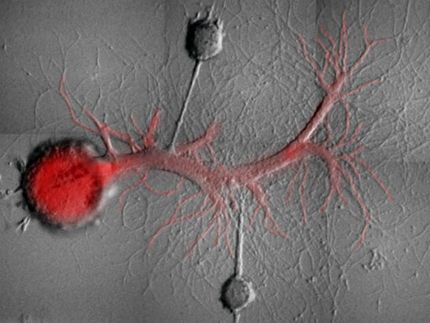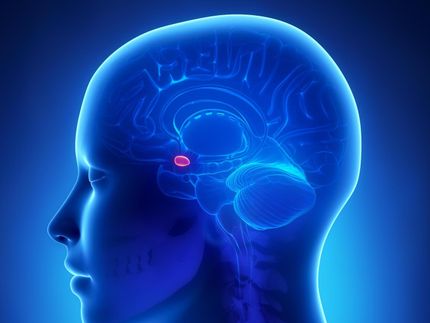30 million euros: Cottbus start-up receives largest research funding in Europe
Cyberagentur finances revolution in neuro-adaptive human-machine interaction
Advertisement
On 15 December 2023, the Agentur für Innovation in der Cybersicherheit GmbH (Cyberagentur) signed a contract worth 30 million euros with the Cottbus-based startup Zander Laboratories GmbH. The company will develop neurotechnological prototypes over the next four years to revolutionise human-machine interaction and artificial intelligence. High-risk interventions in the brain to control machines will no longer be necessary.
The management and project management of the Cyberagentur's new research contract with the contractor Zander Laboratories GmbH (Zander Labs) met at the Brandenburg University of Technology Cottbus-Senftenberg (BTU) to sign a contract worth around 30 million euros. The Cottbus-based start-up won the competition with the most innovative idea for researching neurotechnology in the context of human-machine interaction over four other providers. The contract is the largest single funding of a research project in the European Union awarded by the Cyberagentur.
On 7 October 2022, the Agentur für Innovation in der Cybersicherheit GmbH (Cyberagentur) published its "Safe Neural Human-Machine Interaction" tender. The goal of the call for proposals was to make human-machine interactions beneficial and secure for the citizens of Germany at an early stage in terms of cyber security.
Start-up impresses with ground-breaking idea
Zander Labs proposes the innovative project "Neuroadaptivity for Autonomous Systems" (NAFAS), which aims to revolutionise the interaction between humans and machines. Although technology has made tremendous progress, machines remain limited in their ability to understand, learn and respond to human emotions, mental states and cognitive decision-making. This limitation leads to cumbersome communication between humans and technology and limits the potential of human-computer interaction. The NAFAS project aims to change this paradigm. The project is working with a so-called passive Brain Computer Interface (pBCI). This means that, in contrast to conventional approaches in neurotechnologies, the user does not have to actively imagine certain things, but simply performs the desired action - as we are used to doing in everyday life.
The researchers then try to use the brain signals to find out which mental states the person has used to achieve their goal. The ultimate aim is to identify categories that can be transferred to artificial systems and enable machines to interpret human mental reactions in a given context. The goal is to research a new generation of machines that can adapt to the user's cognitive and affective states in real time in order to personalise the user experience and improve the effectiveness of autonomous systems without the need for manual input.
Prof Dr Thorsten Zander, Managing Director of Zander Labs and Lichtenberg Professor of Neuroadaptive Human-Technology Interaction at BTU, and his team are excited and eager to get started on the NAFAS project commissioned by the Cyberagentur. "Our declared goal is to redesign the interaction between humans and technology: We are striving for systems that can intuitively adapt to the individual user based on their brain activity and for AI applications that learn directly from the human brain."
"The project impressed us with its conceptual strength and innovative approach," says Dr Andreas Schönau, Deputy Project Manager and Research Officer in the Human-Machine Interaction Unit of the Secure Society Department at the Cyberagentur. "The implicit approach is unique and has the potential to set new scientific standards in the neurosciences."
The researchers at Zander Labs will develop a neurotechnological prototype over the next four years. These should be able to read information from a brain so that a person can exchange information with an external system via their thoughts and thus guide it to complete a task or learn new skills.
If this is successful, humans and machines can perform actions, pursue goals and exchange information together via pBCI. At the end of the project, four demonstrators will be created that contextualise the principle presented and transfer it to specific use cases in internal and external security.
Human-machine interaction without invasive interventions
"The revolution will be that we enable machines to capture and interpret brain data in real time, giving them an insight into the user's current, individual perception and interpretation. This will enable us to transfer the user's knowledge, values and goals to the machine, allowing intuitive interaction," says Prof. Dr Zander, summarising his concept. "This approach in the field of brain-computer interfaces (BCI) clearly shows the differences in approach between the USA and Europe. While the US favours invasive methods and focuses mainly on medical applications, we focus on non-invasive technologies and aim to serve users without limitations. This will revolutionise human-machine interaction." Zander Labs places the highest value on security and privacy when processing brain data and transferring it to the machine. This is possible because the systems are compatible with humans and the artificial intelligence is therefore aligned with that of humans. Despite the significantly higher funding in the USA, this pioneering research approach is therefore being rethought and further developed in Germany and Europe. Europe is at the forefront of research in this field.
As the leading force behind this project, Zander Laboratories GmbH is pooling both its own expertise and the specialised knowledge of the subcontracted institutions. These include the Fraunhofer Institutes for Photonic Microsystems (IPMS) and for Digital Media Technology (IDMT), the Dutch TNO, Brain Products GmbH in Munich, Eaglescience Software B.V. in Haarlem and academic institutions at the Brandenburg University of Technology Cottbus-Senftenberg, the University of Vienna and the Julius-Maximilians-Universität Würzburg.
Science fiction 'Made in Cottbus': Great importance for the science centre
The Cyberagentur's Research Director, Prof. Dr Christian Hummert, began by reading out the message of greeting from Brandenburg's Minister of Science, Research and Culture, Dr Manja Schüle: "No, this is not a new film project by Steven Spielberg or Ridley Scott - this is science fiction 'Made in Cottbus': Prof. Thorsten Zander from BTU wants to develop neurotechnological prototypes with his start-up Zander Laboratories GmbH and thus revolutionise the interaction between humans and machines as well as artificial intelligence. A highly exciting project. And it is sensational that the Cyberagentur is providing 30 million euros for this disruptive and innovative approach. This is another great boost for science and research in Lusatia. And who knows: maybe we'll see Thorsten Zander's prototypes in a Hollywood blockbuster in the future."
Prof. Dr Hummert added: "Just like in these visionary science fiction films by the two film stars, the work at Zander Laboratories GmbH is like a cinematic odyssey that blurs the boundaries between man and machine. We are facing a challenge that is reminiscent of the complex plots of these directorial legends: risky, but ground-breaking. NAFAS could put us at the forefront of technology. This research can be a leap forward for Germany's digital sovereignty and also a potential catalyst for cultural resonance that goes far beyond the boundaries of science."
Prof Dr Michael Hübner, Vice President for Research and Transfer at BTU Cottbus-Senftenberg, said: "We congratulate Professor Zander and his highly innovative start-up on being awarded this project. The technology that he and his team are researching can be used in many areas. These areas fit very well with the profile lines of BTU Cottbus-Senftenberg. In particular, the profile lines 'Artificial Intelligence and Sensor Technology' and 'Health and Life Sciences' offer the best points of contact. I look forward to the research results and the collaboration with his start-up."
Dr Markus Niggemann, Alderman and Head of the Financial Management, Economic Development & Social Affairs Division, welcomed the Mayor of Cottbus, Tobias Schick: "The commissioning of Zander Labs will strengthen the city's scientific excellence and contribute to the development of innovative technologies. This major scientific contract with a Cottbus-based company will drive forward the transfer of our urban society into a region of the future. The city administration will therefore continue to promote cooperation between the municipality, scientific institutions and industry in order to further develop Cottbus, with its university and research facilities such as Zander Labs, into a centre of scientific progress in the Lusatia region."
Other news from the department science
Most read news
More news from our other portals
Something is happening in the life science industry ...
This is what true pioneering spirit looks like: Plenty of innovative start-ups are bringing fresh ideas, lifeblood and entrepreneurial spirit to change tomorrow's world for the better. Immerse yourself in the world of these young companies and take the opportunity to get in touch with the founders.


























































